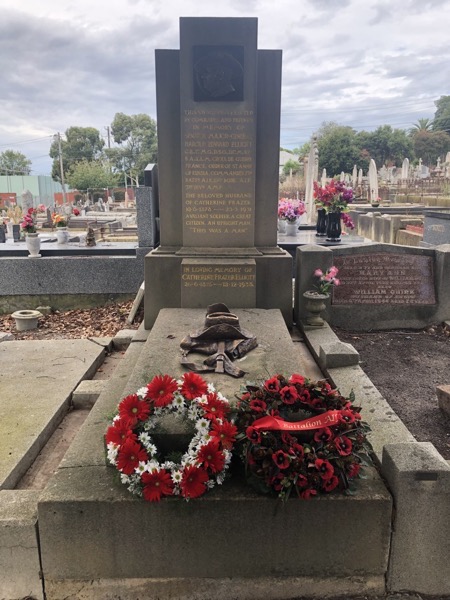
On Saturday, I attended one of the annual memorial services conducted by the Friends of the 15th Brigade to commemorate the death of Harold ‘Pompey’ Elliott at the Burwood Cemetery in Melbourne. Just after WW1, Pompey was one of the three most famous names in Australia along with General John Monash and Albert Jacka.
Brigadier General Harold Edward “Pompey” Elliot was a senior officer in the Australian Army during WW1. He commanded the 15th Brigade of which my Grandfather’s unit, the 57th Battalion, was part.
Pompey (perhaps more appropriately, General Elliot) was a distinguished soldier, renowned for his unique leadership style. At the beginning of the war, he promised that he would care for his soldiers as if they were his own family. This led him to an inevitable conflict where he expected his men to fight hard and be prepared to die, even though he wanted to protect them. His letters to his wife showed that he was a very caring man. After the war he returned to his law practice and served for a short time as a Senator in the Australian Federal Parliament.
Increasingly, Pompey suffered from what we now call PTSD, but was then diagnosed as “some form of nervous disorder”. He suffered from ‘survivor guilt’ and was unable to get over the trauma and injuries inflicted on his men.
He was admitted to hospital on 16 February 1931 after making an attempt to gas himself in the oven at his home. Early on the morning of 23 March 1931, he committed suicide by cutting his wrists with his shaving razor that had been left in his bedside cabinet at the hospital .
Pompey’s funeral took place on 25 March, 1931. Following a short service at his home, his casket was drawn, with full military honours, including bands and an escort party, on a gun carriage pulled by horses resplendent with black plumes, to the Burwood Cemetery, a march of some four miles. Stanley Bruce, a previous Prime Minister marched in the parade as a common returned soldier. Reports in the newspapers of the time state that several thousand people followed the cortège and lined the parade route.
Our service was attended by a couple of dozen members of the Friends of the 15th Brigade and Ken Wriedt and I were asked to lay the Association’s wreath on the grave.




Bruce, almost too terrible for me to read and yet I thank you for this remembrance. At no time is war pretty; it destroys in so many ways, it destroys lives and families in a multitude of ways. An honour for you to lay a wreath.
I guess the service was held at his home because it was suicide. War does not stop when peace is declared.